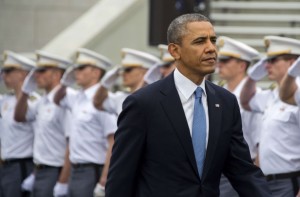
 The United States continues to face challenging and complex global crises, and the President and Vice President Biden used commencement addresses at the U.S. Military Academy and the U.S. Air Force Academy to discuss America’s role in the world.
The United States continues to face challenging and complex global crises, and the President and Vice President Biden used commencement addresses at the U.S. Military Academy and the U.S. Air Force Academy to discuss America’s role in the world.
Building on the policies he implemented during his first term and emphasizing that development is a core pillar of national security, the President argued that America needs to “broaden our tools to include diplomacy and development” as we engage with the rest of the world.
“Foreign assistance isn’t an afterthought,” and the President made the case for how we are changing people’s lives through programs like PEPFAR, Feed the Future, and Power Africa. He reminded America that through the power of “diplomacy and foreign assistance, as well as the sacrifices of our military – more people live under elected governments today than any time in human history. Technology is empowering civil society in ways that no iron fist can control. New breakthroughs are lifting hundreds of millions out of poverty.”
Echoing the President’s comments, Vice President Biden pointed out, “America has to remain a force of dignity and relief from suffering. That’s why we have to continue to help and to provide to people in desperate need and continue to lead the world in fighting hunger and disease.”
While President Obama indicated that America is “the indispensable nation” when helping those around the world suffering from poverty, disease, or humanitarian disasters, he argued that America’s actions to empower individuals through economic engagement can have a positive impact as well. “America is not afraid of individual empowerment, we are strengthened by it – by civil society and transparency; by striving entrepreneurs and small businesses; by educational exchange and opportunity for women and girls. That’s who we are. That’s what we represent.”
As drawdown of troops in Afghanistan has been in the news this week, questions remain about our sustained commitment to development and diplomacy in that country to protect America’s hard fought gains. Keeping that in mind, we should be cognizant of the lesson from the final scenes of Charlie Wilson’s War that if we do not remain engaged, a power vacuum may ensue that could impact our security interests in the future.
Citing the numerous security and humanitarian challenges facing the United States and the global community, the President concluded, “We don’t have a choice to ignore what happens beyond our borders,” and “America must always lead on the world stage. If we don’t, no one else will.”
In a world of so many challenges, America’s development and diplomacy programs continue to be vital elements for responding to these complex crises that know no borders. Dealing with these various national security risks will require more than just a military response, but all our tools of national power.